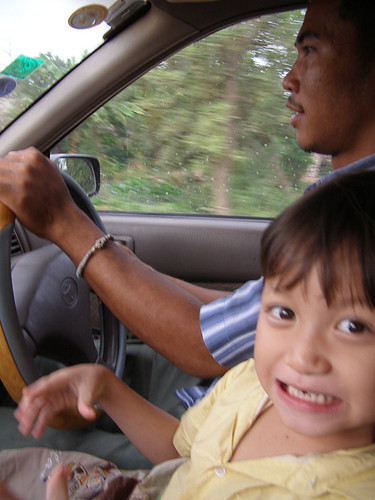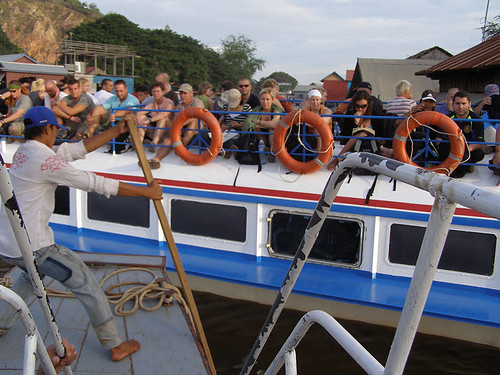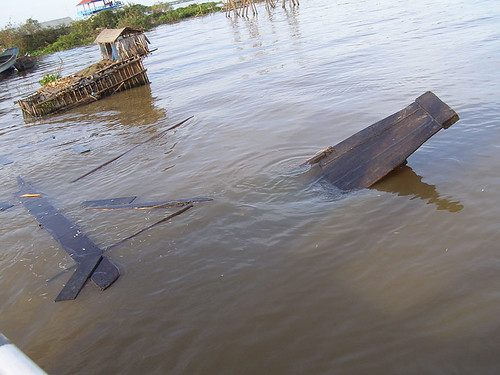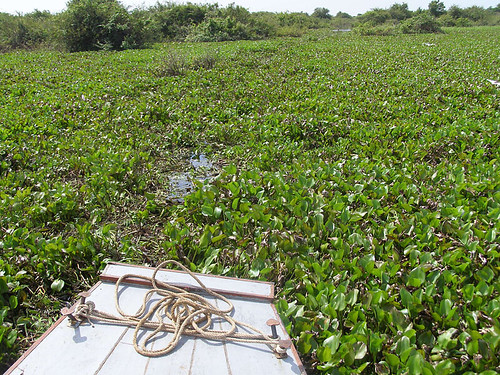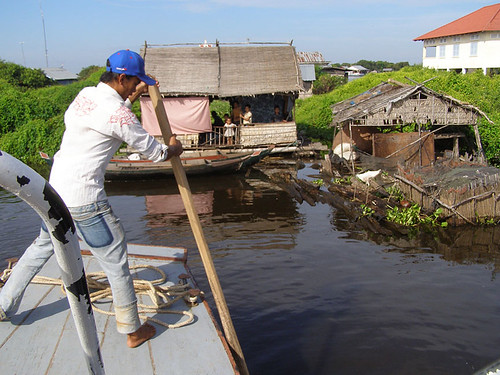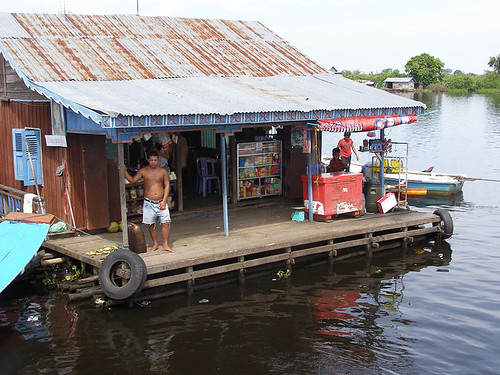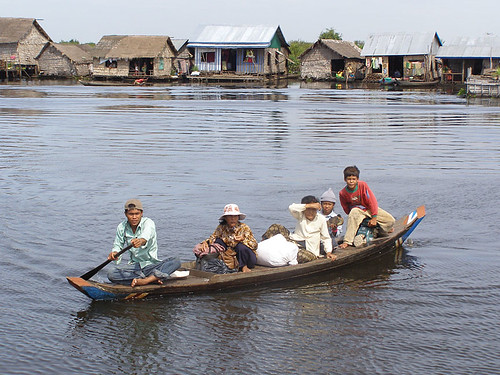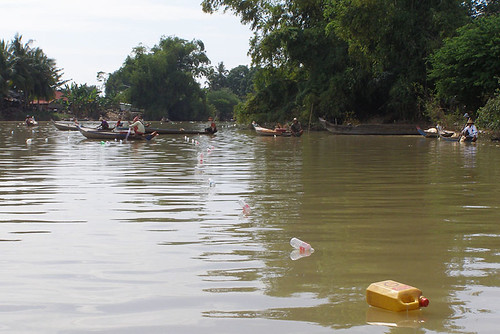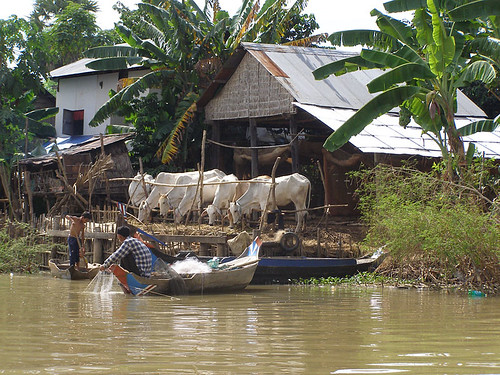You Sunk My Battleship
I've spent the last few days riding a bike around to visit the ruined temples at Angkor Wat, Cambodia. Since it was so hot and I was on a bike, I didn't make it out to the far flung temples, but did get to spend a lot of time in several nearby temples each day, exploring and drawing pictures. But yesterday I got sick again in the afternoon which was a real drag. I ended up puking on one of the most famous temples at Angkor. Oops! I tried to ride home but ended up putting the bike on the back of a tuk-tuk taxi and went limping home. So much for my last night there.
Fortunately I was feeling better by this morning and made it up just barely before the bus left at 6:30 to the boat landing. Well, it wasn't really a bus as they had told me. It was a pickup truck, with a dozen foreigners piled into it with all our big backpacks. And when we got to the landing, the boat wasn't much different. People down below and up on the rooftop. I was thinking of Filipino ferry boats overloaded and rolling over. But it seemed stable as we set off into the flooded forests of the Tonle Sap, an amazing lake that grows and shrinks with the seasons, fed by a reversing river. Right now the lake is about at its high point, and soon the river will reverse to drain back to the Mekong and to the sea.
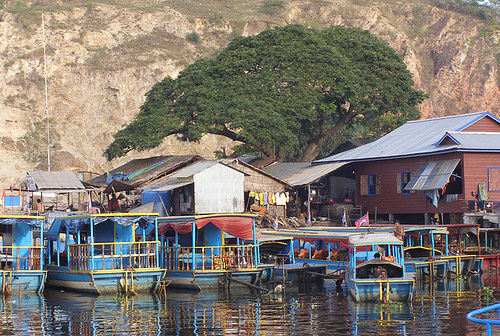
Just five minutes after leaving the landing, we were steaming along at top speed past a thicket of bushes (really the tops of a group of flooded trees). Suddenly out from behind the bushes comes a wooden longtail fishing boat headed directly across our path. The boy running the engine hesitated for a moment, unsure whether to throw it into reverse or gun it. But it didn't matter much because they were doomed. For an awful second the two boats glided closer without a sound and then CRUNCH our big wooden keel rode up over and drove down the smaller boat, crushing its gunnels and forcing the bow under water.
All the little sardines in the bottom of the boat came floating out. The two fisherwomen had jumped backwards to avoid the collision, but now they quickly hopped up onto the front of our boat, while the boy captain stood by his throttle, unsure whether to abandon ship. Jump on! they yelled to him, and he too climbed on board just as his boat filled with water and sank with a plop, drawn to the bottom by the heavy car engine in the back. One of the fisherwomen pulled out her cellphone to call for help or a pickup, while everyone else just stared at the little fish and gas bottles now scattered around in the water.
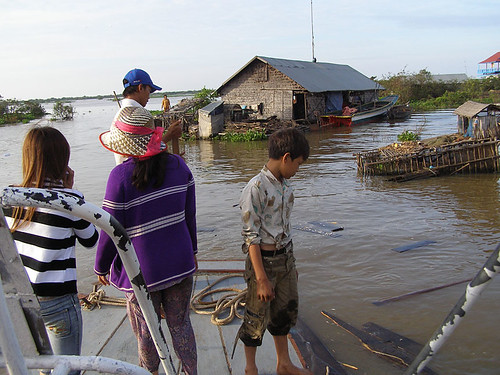
We waited around there for a half hour or more. Eventually a small boat came and picked up the boy, and later a policeman came in a different boat and took the two fisher women back to shore. A kind German woman took up a collection from all the foreigners on board to help the shipwrecked people pay for the salvage of their boat. It all happened so quickly and smoothly that I thought for a moment it might be an elaborate stunt or scam, but if the women and boy hadn't been so skillful at jumping out of the way as they were at driving their boat too fast around blind corners, it could have ended up a lot worse.
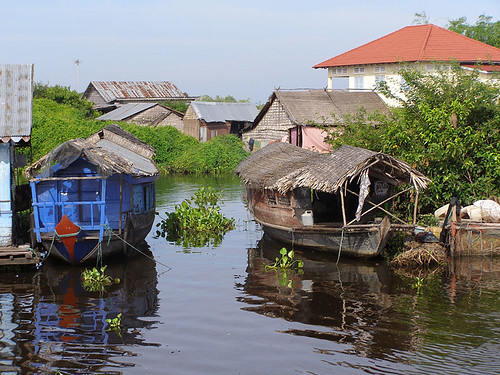
Eventually we continued on, through the flooded forest and out across the big lake. Its a hundred miles long, far enough to not see the other side, but we just cut across a corner and back into the forest, following a river channel upstream.
The boat cut its way through vast carpets of greenery, rippling gently in our wake as we passed through.
We passed a half-dozen floating villages, with houses built on rafts made of buoyant bamboo. I never saw the floating snooker bar a Belgian guy had told me about, but there were floating shops and police stations and other normal little village things.
Almost every floating house or houseboat had a TV antenna, though I don't know where they get their electricity. As we passed, children popped out of the windows and doors, waving their arms hysterically and yelling to get our attention. It must be the most exciting part of the day to see the morning parade of passenger boats passing through the village.
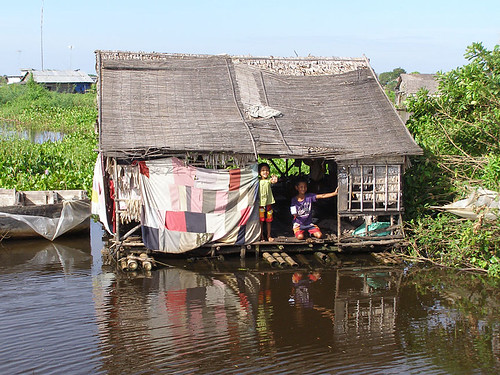
For hours and hours we made our way up stream past the floating villages, past the houseboat villages, and land started to appear. First as a soggy lump revealed by the wake of the boat, then as a few inches of mud, then eventually as real banks and dryland trees and roads and more villages.
Here the river was filled with fisherpeople alone in small boats stringing out nets in long lines marked by empty plastic bottles or chunks of styrofoam. The boat pilot honked his horn and yelled at the fishermen which way to go to get around their nets which were all over the river.
Making our way upstream the banks rose higher and we saw signs of the dryland world of cars and roads and busy commerce. Even after six hours on an overcrowded tourist boat, I didn't want the journey to end. The quiet and greenery of the floating villages seemed so magical and remote from these cinder block houses and stinking scooters of the town of Battambang.
I debated whether to stay overnight here at a hostel, but it seemed to be just clinging to a memory of the magic of the Tonle Sap. The next bus to the border wouldn't leave for a few hours, but I hopped in with a persuasive taxi driver and his five other passengers for the long trip back to the Thailand border and on to Bangkok.
